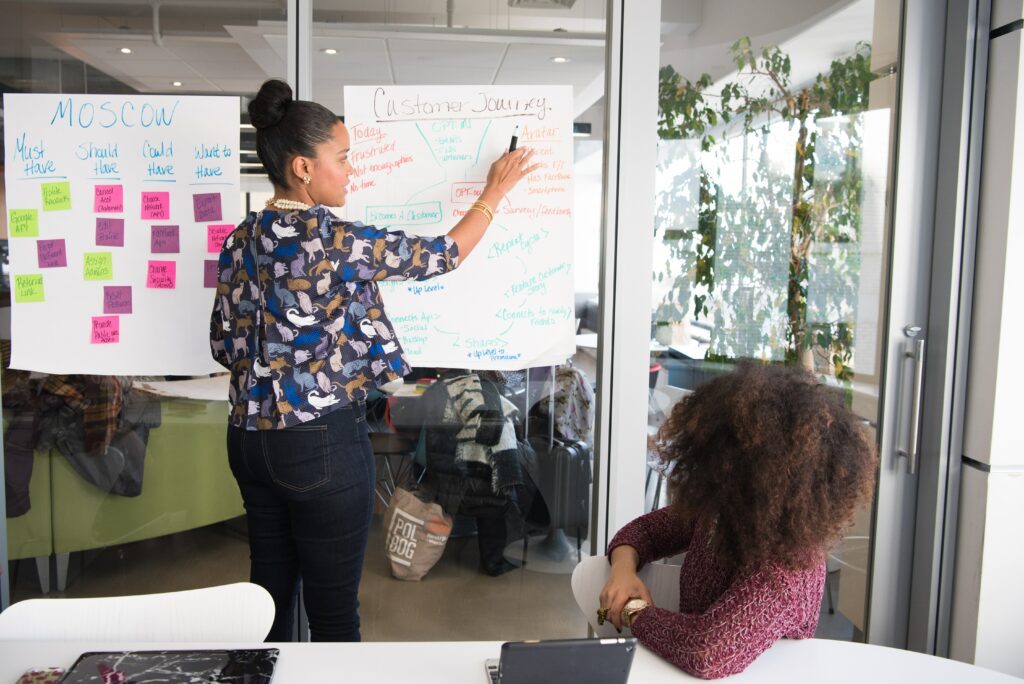AI at the service of HR: towards a profound change in practices and professions
Artificial intelligence (AI) is sweeping across many sectors, and human resources (HR) is no exception. Far from being a threat, AI is proving to be a major ally in transforming HR practices and professions. A revolution that promises greater efficiency, strategy and a resolutely human approach.
Automation: freeing HR from administrative tasks
Imagine HR professionals freed from mountains of forms and time-consuming leave and payment management. This is the promise of AI-driven automation. These repetitive, administrative tasks can now be entrusted to intelligent programs, leaving HR teams free to devote precious time to more strategic missions.
HR Chatbots: 24/7 support
AI-enhanced conversational chatbots become virtual colleagues at the service of employees. These intelligent assistants answer frequently asked questions about leave, benefits, company policies, and can even guide you through common problems. Available 24/7, they offer welcome flexibility to employees and relieve HR departments of the burden of simple requests.
Predictive analysis: anticipating for better talent management
- Identify departure risks: anticipating the potential departure of a key employee enables targeted retention actions to be put in place, such as training or career development.
- Detect high-potential employees: HR data analysis can bring to light employees with exceptional performance or strong development potential.
- Optimize recruitment: by analyzing the profiles of the best talent already in the company, AI can help target the candidates most likely to succeed during recruitment.
This makes predictive analysis a powerful tool for optimizing talent management and driving informed HR strategies.
AI: a new challenge for HR skills
The arrival of AI is shaking up HR professions. To take advantage of these new technologies, HR professionals need to develop new skills:
- Mastering data: understanding and exploiting HR data is crucial to feeding AI algorithms and deriving actionable insights.
- Analysis and critical thinking: it’s not a matter of blindly relying on AI recommendations, but of analyzing them and comparing them with one’s own expertise to make informed decisions.
- Ethics and responsibility: AI raises ethical questions about data confidentiality and automated decision-making. HR must be able to ensure responsible use of AI.
By developing these skills, HR professionals become strategic partners for AI, able to harness it to its full potential to optimize human resources management.
Real-life examples of AI at work in HR departments
Far from being science fiction, AI is already at work in many HR departments. Here are a few concrete examples:
- IBM uses HR chatbots to answer employees’ questions about benefits and company policies.
- Unilever relies on predictive analysis to identify employees at risk of leaving and to set up development programs to retain them.
- Hilton uses AI to analyze candidate profiles and identify those who best match the company culture.
- These examples illustrate the diversity of AI applications in HR and its potential to transform talent management practices.
AI, an ally for resolutely human HR
Artificial intelligence is not a threat to the HR professions, but rather a tremendous opportunity to help them evolve towards greater efficiency, strategy and humanity. By embracing AI and developing the right skills, HR professionals can become key players in business transformation and help build a more fulfilling future of work for all.
AI can transform HR practices, making them more efficient, strategic and people-centric. These includeautomating time-consuming administrative tasks, implementing HR chatbots to assist employees, usingpredictive analytics to better manage talent, and developing new skills for HR professionals.
Implementing AI solutions in HR raises several challenges, such as ethical issues related to data privacy and automated decision-making, the impact on employment and employee acceptance. It’s important to properly identify and address them for a successful implementation of AI in HR.
To take advantage of the opportunities offered by AI, HR professionals need to develop new skills, such as data literacy, analysis and critical thinking, as well as knowledge of ethics and responsibility. There are many resources available to help them train and prepare for AI.
AI is not a threat to HR professions, but rather a tremendous opportunity to help them evolve. It frees HR professionals from repetitive administrative tasks, allowing them to concentrate on more strategic, higher value-added missions, such as talent development and human relations management.
AI can contribute to a more fulfilling future of work for all by enabling companies to:
- Better manage their talents by anticipating their needs and offering them personalized development opportunities.
- Create a more flexible and stimulating work environment by automating routine tasks and giving employees more time for creative and collaborative activities.
- Promote equity and inclusion by using AI to combat bias and discrimination in HR processes.
You may also be interested in 😊

GPEC: Definition and implementation tools
What is GPEC (Gestion Prévisionnelle des Emplois et des Compétences) and how can it be implemented? quarksUp, expert in HRIS, answers your questions.

Annual appraisal interview: objective, grid
Annual appraisal interview: objective, grid
The annual appraisal interview is an opportunity to take stock of performance. quarksUp, expert in HRIS, guides you in preparing your objectives and evaluation grids.

